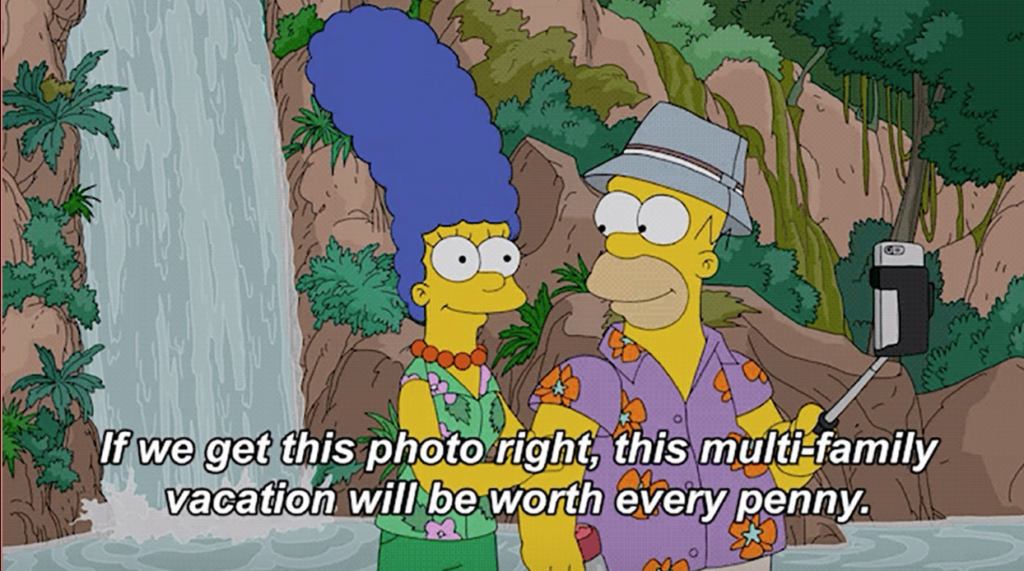There’s quite the tendency for any right that society grants its members, to soon become a duty. It is one’s duty to attend school, to vote, to be healthy… What about the right to happiness and enjoyment?
The model
Imagine a man, ordinarily bored while having a Friday lunch with his in-laws. Not the ‘fun’ kind of situation.
Suddenly, he sees the silver lining and posts a story on Instagram, be it of the nice-looking dish, the pretty view from the restaurant, or any other vaguely interesting object. Still no joy in sight. Until, he starts receiving reactions and likes from his friends and followers: “Oh that must be so fun!”, “It looks delicious!”, “Enjoy yourself!”. What really happens is that they perform the task of enjoyment for him and in doing so sparing him of – either doing something to improve the situation, or – simply taking the situation for what it is, a miserable moment. He could have, so to say, enjoyed being miserable.
But it’s quite hard to accept mediocre enjoyment, when we are obliged to pursue happiness. They said it must be fun, so it is my duty to enjoy going out to a restaurant and spending time with in-laws. Since the subject cannot find it in himself to do it, he delegates that task to the same society that imposed it. So why are the other subjects so glad to oblige?
The spectator
The simple answer: for precisely the same reason. The Others are equally obliged to enjoy. And nothing feels guiltier than being miserably bored. So their recourse is to gaze onto an Other who is enjoying himself, for a second-hand enjoyment.
Imagine now, another person who is pretending to be busy at work, waiting for the time to pass. She is supposed to be enjoying her work, because that’s what she told her bosses during the interview, and that’s what she tells the strangers she meets at bars. She cannot really bring this boredom out in the open; most times not even to herself, or she’ll have to live with that gloom.
The bored-at-work subject therefore scavenges the web for someone enjoying themselves in a manner that fits her fantasy of enjoyment. She looks for an Other who can act out the enjoyment for her. Had she been horny, she could watch some porn and let the actors do all the work while she simply stimulates herself directly where touch matters. But she doesn’t feel like enjoying that form of fantasy anyway. Thank god for that since she cannot grab herself at work anyway.
What does grab her attention, however, as she scrolls through Instagram, is the latest story of her friend who is currently having a good time at a classy restaurant with a nice view. He is having some good quality time with his wife’s family, while she sits at the canteen sipping bland instant. She browses through his story, drools over the nice dish he ordered and zooms in onto the pretty blouse the wife is wearing. A perfect photo of a perfect moment. She likes the picture and even comments on how enjoyable his lunch must be. Then she enters her friend’s profile to skim through the last posts he had shared. Seems like he’s been to some good restaurants lately. That’s so cool. Oh he just uploaded another photo of the entire family together. They seem really happy.
And so was she for these last thirty seconds. But now the climax is over and she will come down, unless she finds something else to enjoy. Scroll away!
For as long as she manages to find images of Others acting out her fantasy, she can keep on enjoying that fantasy with herself still remaining in a passive state of inhabiting reveries. The friend having a lovely lunch does the enjoying for her while, most pragmatically, she can carry on doing whatever she was doing, without having to act upon her desires.
The moral of the story: the two characters could find enjoyment, not in their situation, but in their fantasy of the Other’s joy. They are co-dependent.
If it’s not on record, it did not happen
I sometimes ask myself, at what point in a relation does a couple suddenly decide that they should get married? What suddenly goes so right, or so wrong, that they have to make their relationship recognized by an official big Other?
Or think of an improvised flash mob that takes place in a public square. The first thing you can notice is how all the surprised individuals who happen to be passing by, immediately take out their phone to record the incident… not for memory’s sake, but for the sake of sharing it with their ‘Others’ who can enjoy it for them. If their phone happens to be dead, the feeling of disappointment would surround precisely the knowledge that nobody can provide validation of their magical moment. The sentiment that arises is that nobody will enjoy it for them and so they have to carry the burden of processing all the enjoyment themselves, without an intermediary. The closest they can now get is to later tell everyone at work what they had just seen. But that no longer cuts it in the age of multimedia second-hand enjoyment.

At a personal level, this thought presents a self-reflection on the passive ‘acting-out’ of enjoyment in our ordinary everyday habits. But at an ideological level, what is more worthy of analysis is the manner by which neither the model, nor the spectator are fit to enjoy their own circumstance on their own, and yet both are somehow able to enjoy it through the Other. Both are lactose intolerant and cannot drink this milk of enjoyment, yet it seems to mysteriously work if they allofeed each other like birds. They have to be each other’s stomachs, but cannot be their own.
Both the guy eating with his in-laws and the friend who watches him, objectify themselves as the vessels of enjoyment of the other person. They act for each other the fulfilment of fantasies, even though they are both having a sombre afternoon. So how can it be, that they are both feeling miserable yet somehow also conjuring some form of joy to bestow upon one another? What spell is it that transmutes one’s disappointment to another’s satisfaction?
Equilibrium: The alchemic character of Ideology
As tradition has it, the spell is cast by means of rituals – rituals answering the ideological demand to enjoy.
Which brings up the dilemma: Why does the subject answer the ideological demand of enjoyment? Why does it settle for the ritual and not for the actual, real thing?
The answer we can now give is that by going for the real thing, we would get too close to the realisation that whatever we fantasised about for months, does not deliver what had been promised to us, or what we had promised ourselves. In that case, we would become hysteric and unable to explain why it is that we should spend time with our in-laws, go to work, go to church and so on.
After the pragmatic considerations (‘my wife will be disappointed’, ‘I will not have money’, ‘I will not be part of the Church’…) we are left with a thoroughly unbearable task to commit to. In other words, for humans to commit to a duty, they have to bind it to a fantasy. And that fantasy is meant precisely to be acted out in a ritual, to be mystified by a code of conduct, to be made possible only through the acting out of an Other, precisely so that we do not get too close to it and see it for what it really is, a void; the void of one’s own connection with the realm of desires; the realisation that the stomach of the other subjects is just as defected as ours, and cannot digest this milk of enjoyment.
None of us are really capable of digesting. We cannot do it for ourselves, and much less for Others. But what we can do, is precisely to act out the allofeeding. In other words, we find a way of talking and daydreaming about our desires, since they can only exist within the structure that supports their meaning. What good is a vacation if you don’t share stories? What good is a romantic relationship if you cannot exchange rings and vows in front of a minister? What good is eating at a restaurant if it is empty? What good is studying at a university if you don’t get a graduation parchment?
We cannot go too far from this structure comprising the other interdependent subjects, or we would not be able to see the desire (and hence to enjoy). But we also cannot get too close, or it will become clear that the desire is not there and that the Others do not really see it either. We find a perfect distance, an equilibrium, so that we may carry on enjoying while depending on Others to act out what it is that we should enjoy. But they also cannot tell us explicitly, for they also do not know.
Due to our incomplete satisfaction from the received joy, we, as equal subjects seeking further fulfilment, carry on supporting the cause and act out the rituals for each Other. And so, our fantasy can stay unthreatened in this balance. Our curse remains that we want to enjoy what we do not have the stomach for. We all pretend to eat and see Others doing the same at a distance, appearing as if they are eating. We all enjoy together, interpassively.
Don’t be too cynical
Such a realisation that we are co-dependent for enjoyment is certainly one that can make any person feel a sense of helplessness. One can either deny that this is the case, or deny the rituals themselves in a presumed act of liberation: “I don’t believe in marriage, I believe in pure love!” or “When I travel I switch off my phone to rid myself of the toxic expectations, thus enjoying the vacation for what it is”, and so on… The idea is thus that we can remove the ideological filters and enjoy the Thing-in-itself.
Think of the couple who spice up their sex life by recording their sexual acts on tape. They know well enough that no one else will see those videos, but they still act as if they are being watched. The camera beholds the fantasy that there is a voyeur witnessing their act, providing it with an existence within the social symbolic order. You do not need to share your experiences; you only need to imagine them shared – even in the fantasy of a secret rendezvous, the idea that you should not get caught depends on the obsession on what would happen if one got caught.
So the one thing that the ‘purist’ or ‘authentic’ attitude fails to recognise is that anything we experience is still processed through the concepts we were bestowed by that same ideology we disavow. When we look into the mirror, we always do so through the gaze of an Other. We are inescapably split into a first and third person.
To try and deny the overarching ideological gaze of experiences would be the equivalent of holding your breath just because the air around you is not pure… you can only do so for a very short moment until you have to breathe again. So since we are in it, we might as well explore ourselves through it. By disavowing our co-dependency, we perhaps deny ourselves one hidden enjoyment: the fact that we exist in a structure which we can never escape from and yet which we can always interact with and explore further, even if there is no end in sight.
The key is therefore to stop trying to explore ourselves as authentic free individuals, and instead consider our own person as a uniquely contingent mind in a Petri dish culture. That is, we are human, and we are ideological, and through any personal experience we can understand something more about the society we live in. So rather than escaping society to find ourselves, we can study ourselves to understand society.


0 Comments